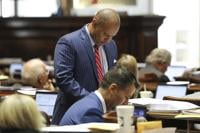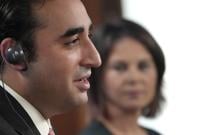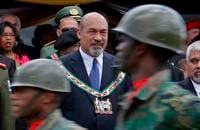LINCOLN, Neb. (AP) — Nebraska lawmakers are considering a bill that would allow teachers and school staff to physically restrain disruptive students and remove them from classrooms without fear of being disciplined, even as critics say physical restraint has been used disproportionately against minority and disabled students.
State Sen. Dave Murman, who introduced the bill, told the Nebraska Legislature's Education Committee on Tuesday that the bill is needed to protect teachers and students, recounting news reports of violent behavior by elementary aged students in several instances across the state.
“Friends, we have got to do something here,” Murman said. “These acts have left several teachers traumatized and looking for a new line of work.”
The action comes as the and how to handle them has ramped up in recent months. In Arkansas, the governor just signed a bill that expanded its existing restraint law to add that — in addition to teachers — other school staff can also restrain students in some cases. Some states still allow corporal punishment, and in Missouri, a school district in the southwestern region of the state last year as a form of discipline, as long as their parents agree to it.
But other states — including California, Texas, Idaho and New York — have introduced bills this year that would put limits on restraining and sequestering students.
While the Nebraska bill specifically prohibits the use of physical contact to inflict pain or as punishment for a student's behavior, civil liberties advocates oppose the policy, largely out of concern that it would make Black and Native American students and those with disabilities more likely to be removed from classrooms.
That includes Rose Godinez, a lawyer with the American Civil Liberties Union of Nebraska, who said the answer to disruptive students is “more funding, resources and training” for teachers.
“It is disheartening to see state senators take another run at passing this misguided bill that could risk kids’ well-being and educational opportunities,” Godinez said. “We will oppose this bill every step of the way and will advocate alongside parents, guardians and teachers to protect students’ rights.”
But the measure — which lawmakers have tried over several years to pass — has the support of the state's largest teachers union. Isau Metes, representing the Nebraska State Education Association, said she has herself physically intervened in a fight between students when she was a teacher in Lincoln, knowing she could face discipline for doing so. While she didn't face any reprisal for doing so, she knows of teachers who have been fired for breaking up fights, she said.
The teachers union noted that the Nebraska bill allocates lottery funds to provide behavior awareness and intervention awareness training, including learning how to spot trauma and engage in verbal intervention and de-escalation techniques. It would also require annual reports on school staff's use of physical intervention with students.
“School violence is on the rise across the state. Students do not have the ability to cope or self soothe when triggered. Educators do not have the tools to help support their students and ensure safety in the classroom," Metes said. "This bill is about protecting students. I will be blunt with you senators; I can take a punch. I am not in fear for my safety. I am in fear for my students.”
Metes and one other person testified in support of the bill, but the measure drew opposition from more than a dozen others, including the Omaha Public School District and the Nebraska Council of School Administrators.
Dunixi Guereca, executive director of the Nebraska-based public schools advocacy group Stand For Schools, agreed with other opponents that the bill is worded so vaguely as to shield teachers who physically restrain students from legal liability. The bill does not define the terms “physical intervention” or its “reasonable” use, he said, and it's unclear if the bill would shield a teacher who physically intervenes in a fight between two students after school.
“It is simply unnecessary to enumerate these protections in statute, and we fear that putting this language in statute will encourage the use of physical intervention in Nebraska schools,” Guereca said.
The Nebraska committee will determine at a later date whether to advance the bill to the full Legislature.








































